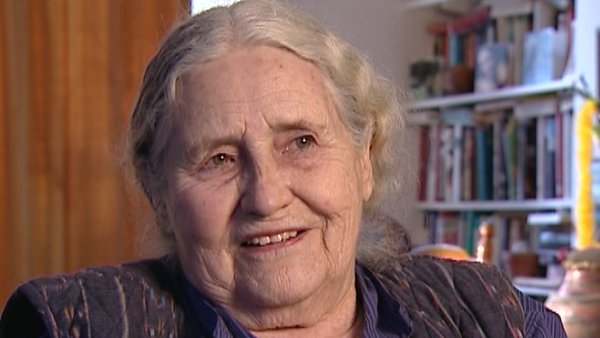To me, I think the most important thing I can say, as a writer... but maybe... well, I think so, at any rate. It's about the use of dreams when you write. Now, to some writers you say, 'Do you use dreams?' And they say, 'Oh, no, no, I never dream'. But other writers, 'Oh, yes!' And then it gets interesting.
Now, it's not just writers. If we remember, there was a scientist who discovered the structure of the atom because he dreamed it; this was a scientist who discovered the structure of the atom... he dreamed the structure. So there is, in effect, a whole technique which you can use about anything – it doesn't matter what it is. You have a problem, you don't know what to do. The technique is, you are thinking about this anyway because you have a problem. But if you think before you go to sleep, delay your going to sleep, lie awake and think about this... problem, you'll almost certainly get some kind of response when you're asleep, and you'll wake up with the information in the morning. A lot of people do this, you know: I'm going to sleep on it – that's where that came from – I'm going to sleep on it. And you sleep on it, you have the information. Now, I have had a great deal of help in my books using this. Sometimes earlier on I didn't know what I was doing, I just did it blindly, but the more you do it, the more it works well. Now, I'm going to quote... a time when... a book... where it worked supremely well, and it doesn't always work as well as this.
A book I wrote – it's a sequel to Mara and Dann – it's called General Dann, Mara's Daughter, Griot and the Snow Dog – it's a long title. I had this novel all planned out in my mind, it was all there, beautifully planned, everything in balance, fantastic – then I started to write. And what happened? Very seldom happens to me. In came a character that I hadn't planned for... griot. Now, this griot is a North African word which could be French or English, for a storyteller or song – the praise-singer for the king... or it edges on the very verge of the shaman, or a magic man – he's just there on the edge. He came into this story strongly, not as something magical and extraordinary, but as a very practical solid man who... without many... much imagination... but there he was. The whole book was upset. It all went out... astray, it didn't have a balance, I didn't know what to do. I was about to throw the whole thing away. It certainly didn't have a voice.
Then I thought, now hang on a minute – we will try with this one. So I am thinking about the problem of this unbalanced book, and what to do to put it right. So I dream – almost the first night I put the problem into my unconscious – comes up this dream. I dream that whoever is standing on the edge of a pool or marsh, and in the pool or marsh are three drowned creatures, which you then discover are the snow dogs. But one of them is alive, and Dann fishes the one that is just alive out, and this dog becomes a... a major character in the story with a motivation of his own. He plays a part in the plot, you know, not just... he's not just decoration. So my dream gave me in one night what I needed.
Now, I'm afraid it doesn't always happen like that, but it can happen like that. So I'm saying it, because it can happen, that people should try and trust their unconscious more because it's amazing what it can come up with.






